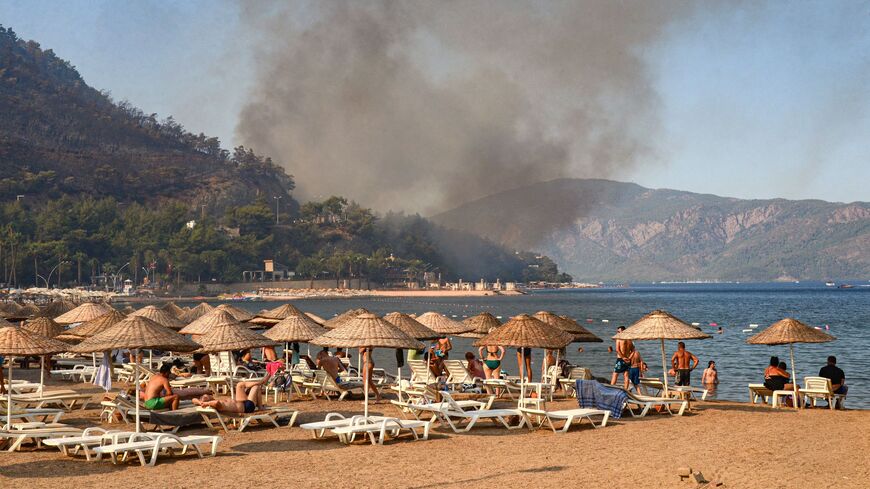As wildfires in Turkey’s south coast delivered a fresh blow to the struggling tourism sector, the country’s tourism minister appealed to local vacationers not to cancel their bookings in the fire-hit areas.
“We need to tell the whole world that we are returning to normal life quickly,” Mehmet Nuri Ersoy said after an Aug. 7 meeting with representatives of the tourism sector in Bodrum, a coastal town in the southern Aegean region that was a pre-pandemic hotspot for foreign tourists.
“What the people here need is not only aid but normalization of life. The greatest help you can give them is to come here, have a meal, make your holiday plans in this region,” he said, in a subtle recognition that local rather than foreign tourists are needed to keep the ailing sector alive in 2021.
Turkey’s Forestry Minister Bekir Pakdemirli said Monday that all the fires had been put out except for two in the southwestern province of Mugla and praised the heroism of the firefighters. The minister has been under fire for the government’s lack of planning and equipment to fight the 240 fires that effected Turkey’s 47 provinces. Later the same day, Greek Foreign Minister Nikos Dendias announced that Turkey would send two helicopters to help Greek fires as the blazes in Turkey were now under control.
Turkey’s wildfires, which started on July 28, killed at least eight people and countless animals and turned hundreds of hectares to ashes. In country’s touristic south, known as the Turkish Riviera, villagers and tourists had to be evacuated and some rescued by sea. In Bodrum alone more than 4,000 tourists and staff were saved by the coast guard. The European Union has issued its highest fire risk alert for areas of Turkey, Italy, Portugal, Spain and parts of North Africa, Euronews reported.
Bulent Bulbuloglu, vice-chair of the Turkish Hoteliers Federation and president of the South Aegean Touristic Hoteliers Association, said that the fires are the final straw for a sector that has already suffered two tough years.
The United Kingdom kept Turkey on its COVID-19 high-risk countries in its Aug. 5 reassessment. It was a serious blow to Mugla, one of the areas hit hard by a multitude of blazes. Mugla, home to the touristic hotspots of Bodrum and Marmaris, used to host 1.5 million British tourists a year before the pandemic and tourism operators and managers were hoping to see some of the regular holiday-makers return in late August or early September.
UK Transport Secretary Grant Shapps said several reasons — including the way Turkey registered its COVID-19 data — played a role in keeping Turkey on the red list. “All these decisions are always based on science," he told ITV’s “Good Morning Britain.” "We … look at the number people vaccinated, the variants and whether the data is entered in an internationally recognized format. … It would be a combination of these factors that has prevented Turkey [from being on] the amber list,” he said, expressing hope that it will be possible to move Turkey there “before not too long.” The next review is expected on Aug. 25.
“The best that we can hope for is to have the British tourists back in mid-autumn, if Turkey’s listing changes,” Bulbuloglu told Al-Monitor. “So far, we have had tourists from Russia, Poland and Ukraine, but the fires have decreased that, too.”
He explained that the sector largely depended on local tourists who have been holidaying in the south ever since Eid al-Adha in mid-July. “Many of the hotels have operated at full capacity during and after the Eid, but now the vacancy in the hotels on the southern coast is halved or even reduced to one third, as in Marmaris." Marmaris is a harbor town known for busy beaches and bars.
Antalya, which is 200 miles (320 kilometers) south of Marmaris and a favorite of Russian tourists, was also affected by the fires, but not its touristic areas. “Reservations have not been affected,” Erkan Yagci, the chair of the Mediterranean Touristic Hoteliers Association, told Al-Monitor.
Turkey’s tourism sector, which accounted for 4.6% of the economy in 2019, was severely impacted by the pandemic in 2020. Tourism revenues plunged to $10 billion last year — a third of 2019's $30 billion.
Determined not to suffer another disastrous year, the Turkish government sought to woo foreign tourists both through diplomatic efforts against travel restrictions and major ad campaigns showing Turkey as “a safe location” where hotels have safety certificates and all tourism staff are vaccinated.
However, the promotional videos, including one that showed Istanbul as the “new cool,” have attracted more controversy than tourists. Secular Turks mocked that particular one-minute video for presenting an LGBT-friendly and liberal image of the city, which was the opposite of the government’s vision. Conservative Turks, on the other hand, said it looked like a “Benetton ad” rather than a city with strong Muslim heritage. An earlier spot that showed workers wearing “Enjoy, I am vaccinated” masks was criticized by many Turks as humiliating.
But even when tested with fire, tourism insiders have tried to maintain optimism. Speaking to journalists on Aug. 6 in Marmaris, Ersoy said that Turkey maintains its goal of 25 million tourists and $20 million in revenues in 2021. “We all hope that the bookings will start this week now that the fires are put out,” Bulbuloglu told Al-Monitor. “At any rate, we are telling people that we will reschedule their reservations free of charge to any date of their choice rather than have then them cancel their bookings.”








